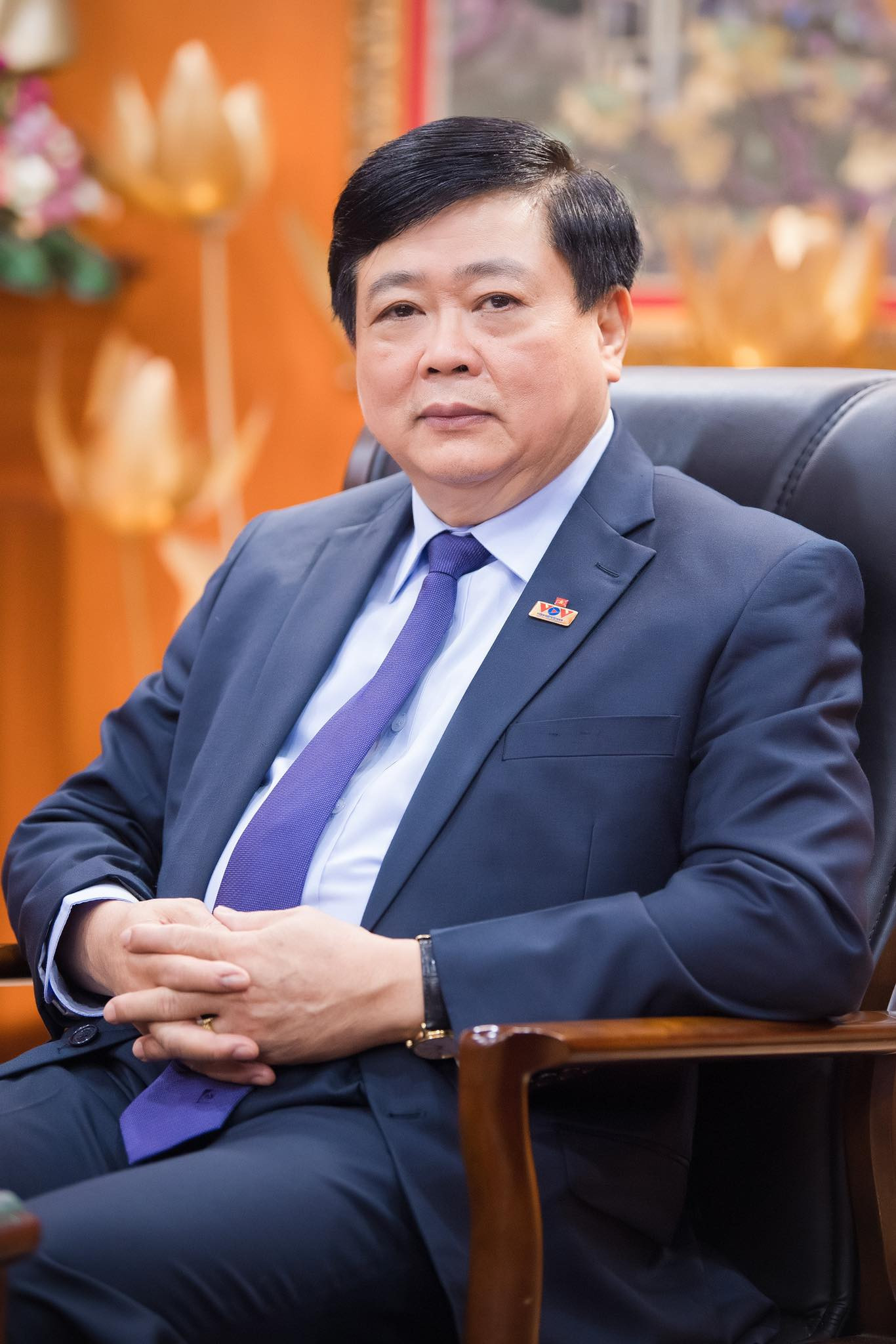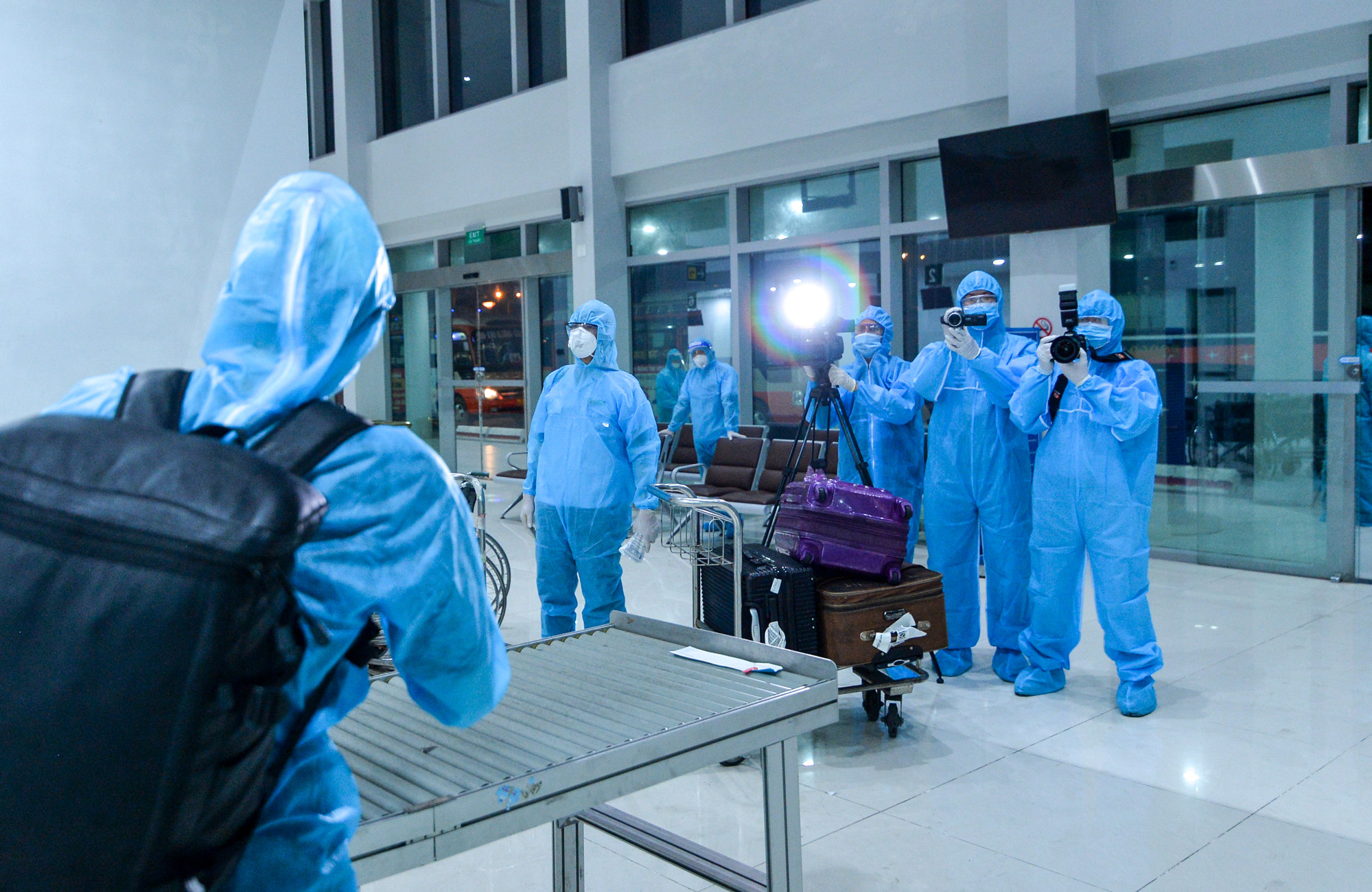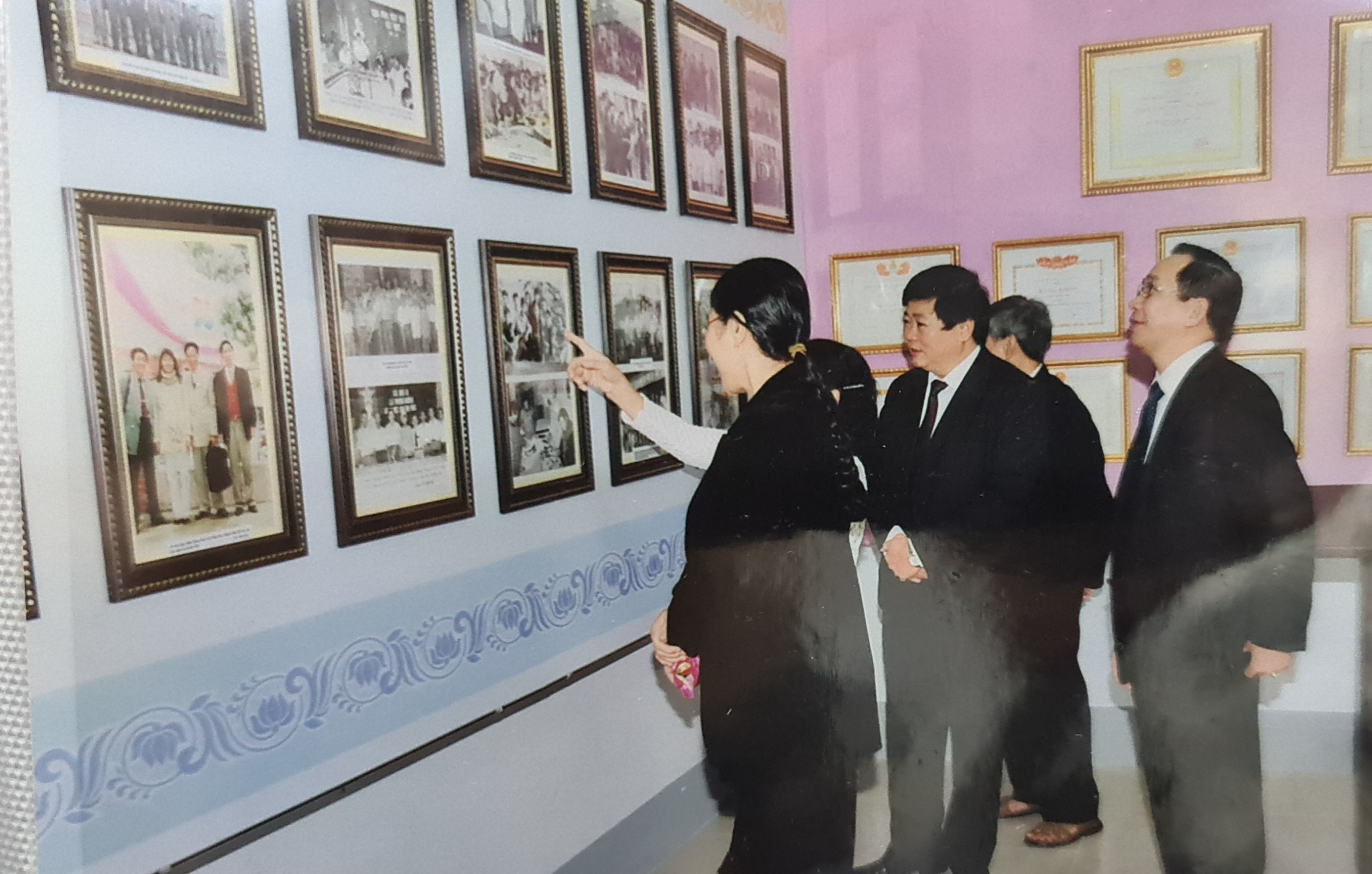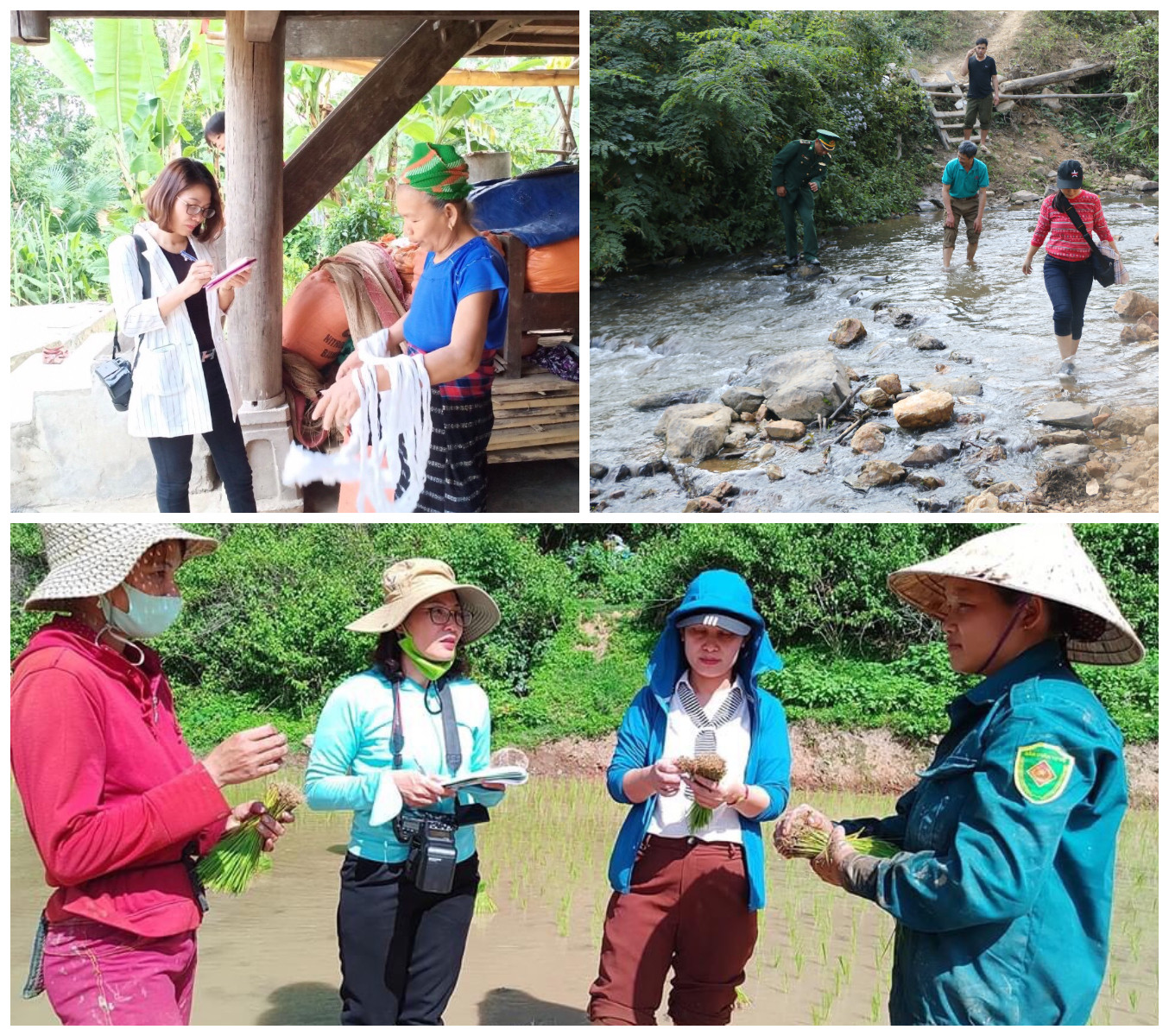'Content is the heart of the editorial office'
(Baonghean.vn)- We must not turn journalistic products into a trivial commodity, a commodity that only aims to make money.
Office of Mr. Nguyen The Ky - former member of the Party Central Committee, former General Director of Radio StationVoice of Vietnam (VOV); Chairman of the Central Council for Literature and Arts Theory and Criticismsurrounded by bookshelves and glass cabinets displaying various old radios and cameras. On the wall is a small black and white photo of him as a young man, looking like a student and carrying a 16mm camera on his shoulder while covering a news event. Our conversation with him about his career as a press agency leader began with that souvenir photo.
 |
| Mr. Nguyen The Ky. Photo: Vo Van Thanh |
Mr. Nguyen The Ky shared: I have just left the Voice of Vietnam to enter a new journey and basically, I have been able to pack up my life as a journalist and a journalist. The happy and sad memories, the successes and failures are all behind. I have grown up in journalism from the position of a reporter. I graduated with honors from the Faculty of Literature, class 22, Hanoi University of Science at the end of 1981, I returned to my hometown and worked atVinh Television Station, under the Vietnam Radio and Television Commission (station based in Vinh City). I worked as a reporter, editor, then Deputy Head of Department, Head of Department of Vinh Television Station for nearly 10 years. Vinh Television Station at that time was a regional television station, quite modern, similar to the regional stations in Hue, Da Nang, Nha Trang, Quy Nhon, Ho Chi Minh City and Can Tho.
Although I studied Literature but loved to learn and explore, I did not stop at the role of a reporter, editor, writing comments for news bulletins, reports, documentaries... I also learned to film, edit, dub, and mix music. In today's journalism profession, we often hear about the convergence newsroom model. It is a meeting place for different types of media in the same newsroom, even in the same journalist (multimedia reporter, multi-type). In the past, this concept did not exist, but we have built for ourselves the awareness that reporters must do many different things, use many different types of media to convey content in the best way.
In the television industry, there is usually a pair that always goes together: Reporter, editor + cameraman. This pair is rarely “perfect”. The cameraman shoots according to his preferences (and his limited understanding of events and happenings!), while the writer, who is supposed to be the one deciding the process of reflecting the content, is like a dependent person. When it comes to post-production, there are scenes that are very necessary and very desirable but are not available, and scenes that are not desirable and not expensive are overflowing. And film is expensive, it has to be imported from abroad. That is why I have been trying to learn the profession of cameraman and also learn the following post-production steps. With documentaries and reports, this is very meaningful. There you go.(Mr. Ky pointed to the black and white picture near his desk), that very handsome, cool, romantic reporter wearing a beret, was me at 23 years old. Just a whisper, a lot of girls were crazy about him, for real, no kidding!
Looking back on my career, I see that I have not made any leaps forward, no one has supported me, I have just worked hard to progress step by step. In 1989, Vinh Television Station was transferred to the province, merged with Nghe Tinh Radio Station to form Vinh Television Station.Nghe Tinh Radio and TelevisionIn 1991, Nghe Tinh was split into two provinces, Nghe An and Ha Tinh. I stayed.Nghe An Radio and Television StationIn 1994, I was promotedDeputy Director of Nghe An Radio and Television Station(in charge of content block).
In 2000, the Provincial Party Standing Committee assigned and appointed me to the position.Editor-in-Chief of Nghe An Newspaper, concurrently Deputy Head of the Propaganda Department of Nghe An. In 2003, I was transferred by the Standing Committee of the Provincial Party Committee to work asSecretary of Nam Dan District Party CommitteeIn 2005, he was transferred to Hanoi to work.Head of Press Departmentof the Central Ideology and Culture Committee. In 2010, I was appointed by the Secretariat asDeputy Head of the Central Propaganda Departmentin charge of press, publishing, culture and arts. The 12th Party Congress in January 2016 elected me to the Central Executive Committee. In March 2016, the Politburo issued a decision on transfer and rotation; the Prime Minister issued a decision to appoint me asGeneral DirectorVoice of Vietnam Radio Station(VOV).
“I am never satisfied with myself and my work”.
PV:From the position of Deputy Head of the Central Propaganda Department to taking on the leadership of a specific press agency, what difference do you see?
Associate Professor, Dr. Nguyen The Ky:I always think that no matter what position I am in, I basically do not change much, there is no significant difference. If anything, the job in each different place comes with different demands and requirements.
While at the Central Propaganda Department, due to the nature of my work, I had the opportunity to fully grasp information from the "root", from many official sources such as the Central Party Office, the Government Office, the President's Office, the National Assembly, ministries, branches and many other forces.
Brothers and sisters who directly lead and manage press agencies also have their own sources of information, but for many different reasons, they cannot be as complete, timely, and systematic as the Central Propaganda Department. Therefore, with my work responsibility, when necessary, I make correct and necessary recommendations to the press brothers. Not to force but with the spirit that we all share the same goal of serving the country and the people. With such complete access to source information, we together decide what to do and how to communicate to ensure honesty, objectivity, and the right direction.
For example, in 2011, the Binh Minh 02 ship was operating in Vietnam's 200-nautical mile exclusive economic zone and continental shelf when it was sabotaged and obstructed by Chinese ships. At that time, Vietnam strongly protested China's violation of the 1982 Convention on the Law of the Sea, demanding that China withdraw and not repeat the act.
 |
| Reporters of Nghe An Newspaper work while welcoming citizens returning home from abroad to avoid the Covid-19 epidemic via Vinh Airport. Photo: Thanh Cuong |
In March 2012, the Binh Minh 02 survey ship was conducting a survey in the area near Con Co Island (Quang Tri province). China sent about 30 fishing boats, which were actually paramilitary vessels, to cause trouble and obstruct the Vietnamese survey ship, making it difficult for it to operate. When our functional forces came out to push them away, those fishing boats fled. During the escape, the propellers of these militia fishing boats got caught in the seismic cable of the Binh Minh 02 ship, causing the cable to break. Based on the accurate information provided by the functional agencies, I discussed the above incident with my colleagues in the press. However, some people strongly argued that saying so was wrong and covered up China's wrongful act of "cable cutting". But I calmly replied that, if we use the word “cut cable”, the verb “cut” always requires a tool, for example, we use pliers or a knife to cut something, and this is a Chinese militia fishing boat when running away, its propeller got caught in the seismic cable of the Binh Minh 02 ship, causing the “cable to break”.
Just one word, but if we want to fight properly, accurately, and convincingly, we have to say it correctly, so that the other side will "accept" us. If we say it wrong, they will argue back, and we will easily lose the argument.
I tell such a story so that from the perspective of journalism, we can share more and sympathize more with those who work in directing and managing the press. Management here is not imposition, nor is it compulsory, but it is telling the truth, fighting with reason and justice, only then can we win. As a journalist, no matter what position you are in, the root is still to have accurate, complete, and timely information to bring trust to the public.
PV: The process of getting acquainted and integrating with the new job atVoice of Vietnam Radio Station(VOV)thenhow did it happen, sir?
Associate Professor, Dr. Nguyen The Ky:Based on practical experience, we can distinguish three types of press agency leaders.One isleaders are content with their lot, "going out with an umbrella in the morning and coming back with an umbrella in the evening", they just hope everything goes smoothly and safely.Second formAlthough ambitious, but unable to organize forces, unable to find goals and solutions to move their agency or unit forward.Tuesdayare people who are not satisfied with the results of their work, always worried, active, creative with the team to find ways to develop the agency. I put myself in the third type. Always ask myself if my unit is good, has it met my and everyone's expectations? Is there any way to make the agency and the work better?
I'm backVoice of Vietnam Radio Station, one of the first things to share with you is that we have inherited an extremely valuable and massive heritage, which is the heritage of the Voice of Vietnam - the first press agency of the Democratic Republic of Vietnam. President Ho Chi Minh read the Declaration of Independence on September 2, 1945, then only 5 days later, on September 7, 1945, the Voice of Vietnam was established.Vietnamese Voicewas established.
In recent years, when different types of journalism have developed strongly, especially when television has dominated a large public market share, then electronic newspapers and social networks have exploded, the radio sector has declined to some extent. This is the rule. I once told everyone at the Voice of Vietnam that we must surpass ourselves, that is, overcome difficulties and challenges to move forward, to be worthy of the glorious tradition of yesterday. This is not a slogan, nor is it voluntarism, but each person at the station must try harder, be more creative, improve the quality of content, form, technical quality, technology, to make the programs ofVOV, belong toVTCmust be fast, correct, good, useful, attract a large audience to listen, watch, read...
PV: In your opinion, what are the qualities needed to become a General?Director, General Directorpractice?
Associate Professor, Dr. Nguyen The Ky:In our country, due to specific conditions, some comrades who lead press agencies, both central and local, do not receive in-depth, systematic training in journalism and journalism skills. Some comrades are transferred from other departments and sectors to become leaders of press agencies. Usually, these people have studied bachelor's degrees in politics or advanced political theory. However, leaders of press agencies need to study thoroughly in journalism, techniques and technology, learn about editorial management, management and administration of a specific press agency (print press, radio, television, electronic press).
Deep understanding of each stage of work is necessary to lead the newsroom; avoid the situation where there are General Directors and Editors-in-Chief who, even when they retire, do not really grasp the core issues of journalism.
Through summarizing my own journalistic activities, I believe that there are 5 factors that a press agency leader needs to equip himself with:
The firstis the capacity to manage and operate the organization and personnel.
Mondayis a content manager, very proficient and sharp in journalism.Tuesday,technical and technological management
Wednesday,Equally important to the three factors mentioned above is financial and asset management.
Thursdayis the ability to communicate with the public.
This is a very necessary factor today to lead, manage and administer a modern press agency, large or relatively large in scale, multi-form, multi-media.
PV:How do you prioritize the above five factors?
The ancients said that no one is perfect, no one is good at everything. In the field of journalism, there are people who are good at content but weak in technical or financial aspects of journalism. Leaders must know how to choose a team to help them overcome their limitations and shortcomings.
In the 5 areas mentioned above, directing and managing content is an important and permanent job for press agency leaders, especially the head.
Content is the heart of the editorial office, of the press agency and is the decisive factor for the survival and development of the press agency, creating the reputation and brand of the press agency.
 |
| Mr. Nguyen The Ky and his colleagues at the Traditional Room of Nghe An Newspaper. Photo courtesy |
Nowadays, news and images will be flooded in newspapers, magazines, especially radio, television and social networks when an event occurs domestically or internationally. The editorial offices face each event with the same basic behavior, but what makes the difference is the way to grasp, handle the problem, the event and bring it to the public. I often share with my colleagues that we should not stop at simply reflecting but must analyze, comment and orient public opinion in a correct and positive way.
Some international experts have used the term “intellectual journalism” – journalism that helps to enhance people’s understanding of the world. We still need breaking news, exclusive news, investigative reports. But intellectual journalism emphasizes explaining, giving correct and responsible views on important and hot events and issues that are happening.
For example, what factors have emerged in French politics under Emmanuel Macron? Why do the yellow vests continue to protest? Are the problems in France only now appearing or have they been accumulating in France for a long time, and now is the time to explode? Or is it the same domestically? In the early days of this summer, public opinion is concerned about the increase in electricity bills in households. It seems that electricity prices have rarely decreased, only increased. So is that increase in accordance with market rules, or are there other factors? These are issues that the press must analyze and report wisely and responsibly to readers.
 |
| Nghe An Newspaper reporters working in the western region of Nghe An. Photo: PV |
Newspapers that want to attract readers must also know how to direct their content to people's issues. Society is increasingly concerned with issues in people's daily lives. Nowadays, people are wiser, have higher levels of awareness, so they care more about their lives, the lives of the community and especially their children such as: electricity prices, gasoline prices, water quality, air quality, food safety, traffic safety, friendly schools...
The important role of the General Director and Editor-in-Chief is to direct the content of the newspaper. Just like the captain, the boat, the oars, the current, the rapids are often the same, but how to row depends on the talent of each person at the helm.
PV:What do you think about team building at work?
Associate Professor, Dr. Nguyen The Ky:I think that a professional Editor-in-Chief will create for himself a professional apparatus. People who are not professional often have an attitude of not valuing this, thinking that "red" must come first, "professional" comes second, third. At that time, you easily go in the direction of evaluating people in the style of "this guy lives well, that guy lives badly" rather than from the professional perspective of this person writes well, that person writes badly.
Journalism is like many other professions. Whether an organization can develop or not depends largely on the human factor, on whether the leadership knows how to use talented people and treat them well. Of course, nowadays, if you want to treat people well, you cannot just say it, but you must have a policy of treatment, at least a respectful attitude when inviting people to work.
Above I mentioned 5 essential factors for an Editor-in-Chief, these are factors that are not completely separate but have a dialectical relationship with each other. You have a strong financial foundation to recruit good staff, purchase machinery and equipment, invest in technology; and with finance, you can organize many activities, both professional and social.
“Without the public, journalism is meaningless”
PV: From the perspective of a press agency leader, how do you view the issue of press economics?
Associate Professor, Dr. Nguyen The Ky:Media agencies in Vietnam are implementing many different financial mechanisms. Some are fully or partially subsidized and some operate autonomously (balance their own revenues and expenditures).
According to the “National Press Development and Management Plan to 2025”, the State has financial mechanisms and policies to create necessary conditions for the press to serve political and propaganda tasks; at the same time, it encourages press agencies to increase resource mobilization for development but must ensure that they are in line with their principles and purposes, and not purely profit-driven.
Here, one thing is certain, the leaders of press agencies all want to be financially independent is the best. However, we must see that in some countries, the government also has financial resources to support press activities in many different forms.
Among the major press agencies under the Government, Vietnam Television (VTV)is a completely financially autonomous unit but also has some large investments from government capital (Japanese ODA capital). Voice of Vietnam (VOV)and Vietnam News Agency has a different mechanism.VTV, Partly state-supported and partly autonomous.VOV, the radio sector is largely supported by the Government because radio activities do not have significant financial revenue; while VTC Digital Television Station, a affiliated unit, is almost completely autonomous.
In this regard, I think journalism can only develop sustainably when it is truly accepted by the public, living off public payments as well as other legitimate sources of income. Indeed, the history of journalism around the world has proven that readers will pay for unique, high-quality content on the platforms and media they love. We know thatThe New York TimesOnce a thriving print newspaper, they have not stopped to fall behind the print industry and have strongly developed their online version. Until recent years, they have had over 2 million digital subscribers (paying to read the newspaper online) and the online business is increasingly bringing in more profits for the newspaper.
Along with revenue from readers, press agencies need to build a strategy to diversify their revenue sources, from advertising, affiliates, consulting, event organization, e-commerce, to digital content production, video and audio making, media... All of these depend on the dynamism and creativity of each press agency.
PV:You once said that “without the public, journalism is meaningless”. Can you elaborate on this?
Associate Professor, Dr. Nguyen The Ky:We all know the saying “Northern literature, Southern newspapers”. For a long time, the Northern press was attached to the subsidy mechanism. Many people read newspapers when they were given free ones, but did not pay to buy them. A drinking party costs several million, even tens of millions of dong, but spending 5,000 dong to buy a newspaper is not a habit, even “stingy”. Meanwhile, in the Southern provinces, just stepping out on the street, we will see everyone from motorbike taxi drivers to street vendors have the habit of reading newspapers.
It is not by chance that over the past decades, Ho Chi Minh City has affirmed itself as one of the largest press and publishing centers in the country. In Ho Chi Minh City, there are over 40 press agencies, dozens of permanent offices, representative offices of press agencies, in which many newspapers, radio and television stations are at the top. With the dynamism and creativity of the city's journalists, many newspapers here have developed strongly, impressively, sharply, meeting the needs of readers both at home and abroad.
Newspapers headquartered in Ho Chi Minh City such asYouth,Adolescent… the number of copies is not fixed but fluctuates according to the content of the newspaper. If today’s issue does not have good articles, does not mention interesting issues, then the number of unsold newspapers will be large; but tomorrow, if the newspaper has many good articles, especially articles on fighting against negativity, fighting against corruption, fighting to protect sovereignty over seas and islands, or touching, humane articles about convincing examples in life, then that issue will be sought after more.
In the current conditions, the press operates according to the market mechanism, news and content in the press become commodities but special commodities due to its influence and impact on society. Our press is revolutionary press so professionalism, humanity and social orientation must be given top priority. We must not turn press products into ordinary commodities, commodities that only aim to make money. But we are also deeply aware that the public's expectations and consumption determine the existence and development of the press agency itself. Without the public, press activities are meaningless. The public here includes from Party and State leaders to ordinary workers in society.
When it is time to broadcast, do listeners want to turn on the radio or TV to watch your program? In the morning, do people want to read your printed or electronic newspaper? These are the questions that journalists are constantly asking.
PV:Thank you very much!


